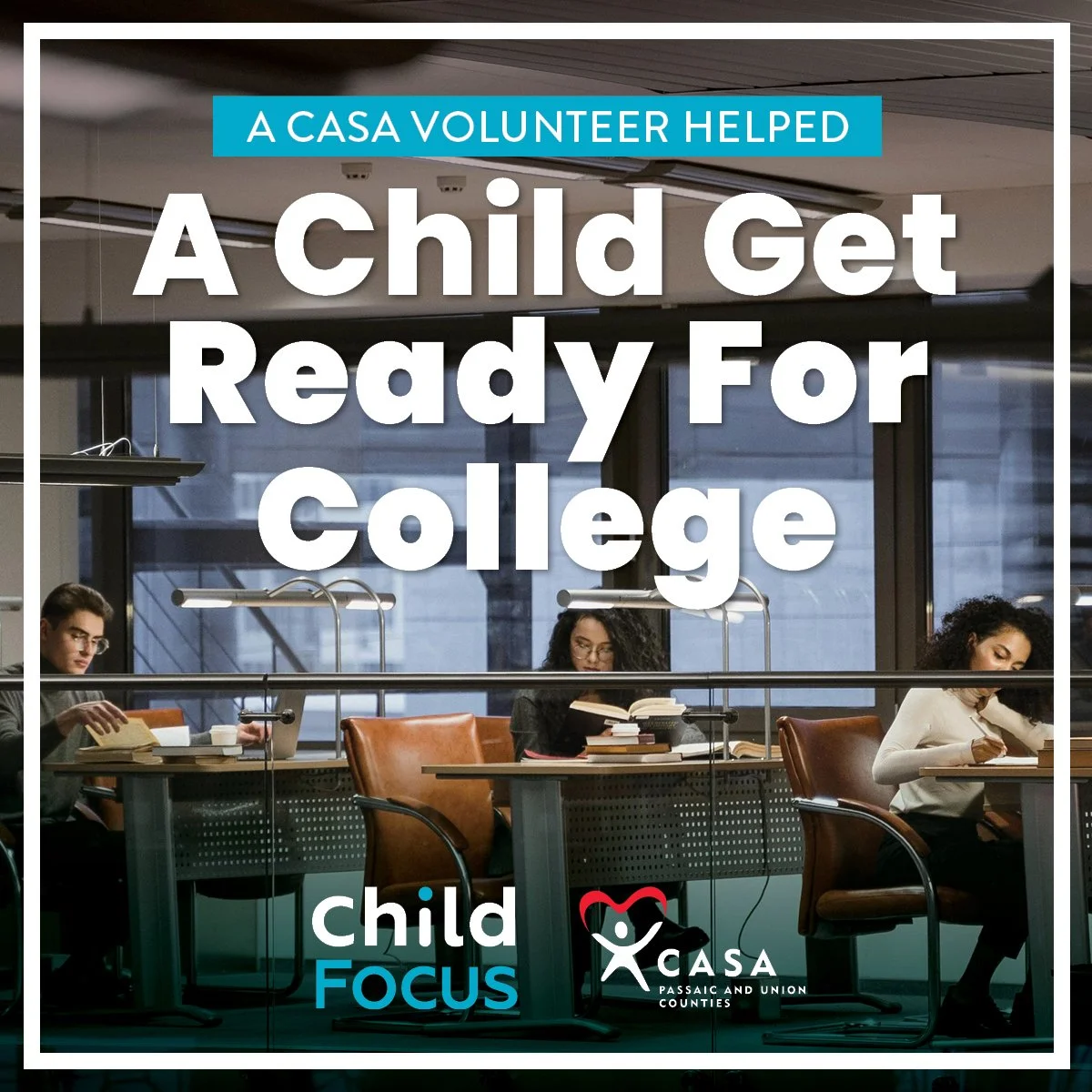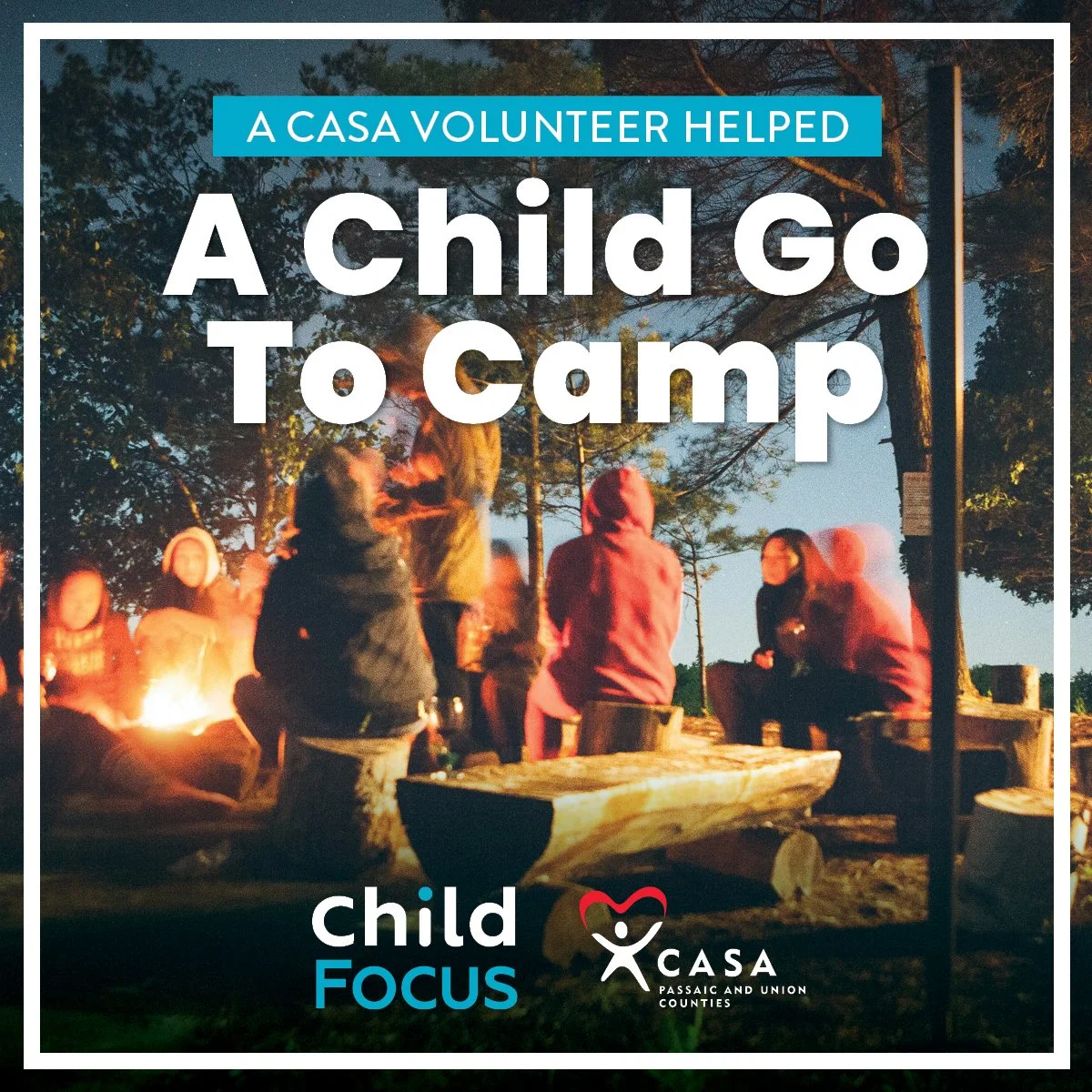Jenny has been in foster care for more than seven years, re-entering after a failed placement. But one thing she’s never lost is her CASA volunteer Karen, who was assigned in 2017.
When Jenny’s case was set to move to another county, she asked to keep it in Union County so she wouldn’t lose the CASA volunteer who’s been by her side. That decision mattered: as Jenny prepares to start college, she found herself just weeks away from move-in and missing many dorm essentials. She purchased what she could herself, but needed so much more. Thanks to her CASA volunteer and Child Focus’ Open Door Store, Jenny is now set with everything she needs: from bedding and toiletries to kitchen and laundry supplies, a backpack, and school essentials. This weekend, she moves into her dorm and next month she turns 18. Having come so far, Jenny’s beginning her new chapter with confidence and support!
When getting medical records for a child in foster care was proving to be a challenge, CASA volunteer Cathy stepped up. Cathy called the doctor’s office, and faxed the request, but to no avail. So, Cathy went to the doctor’s office in person and didn’t leave until she got what she needed. When she looked at the records, it showed that the child was missing several vaccines!
Thanks to Cathy, it was caught in time to get him caught up and the child was able to attend camp!
CASA volunteer Jacqui’s Story
Reunifying Families
The path to family reunification is often long and winding, with challenges parents must overcome to fulfill court and Division of Child Protection and Permanency requirements. These include proof of housing, employment stability, ability to parent, and remedying the initial issues that led to removal.
It was no different for the mom in CASA volunteer Jacqui’s case. Mom was eager to have Jayna, 12, Therese, 11, and Toby, 2, reunified with her and chart a path forward as a family. Mom had been diligently completing program requirements such as learning how to utilize community resources, including those that assisted with housing needs. With Jacqui’s help, mom also became connected to even more local support for additional services.
So it was unexpected when, during the course of mom’s regular drug testing, the lab returned a positive test for fentanyl. While the road to recovery is not often straight, and relapse is often part of the process, Jacqui believed something seemed amiss. She felt sure the lab results must be wrong.
At Jacqui’s insistence the lab re-ran the sample and mom’s results were, in fact, negative. Jacqui had been right. Two months later, Jayna and Therese were reunified with their mom.
For Toby, who had been removed from mom’s care at birth, reunification was more complicated. After all, he had been in one resource home since birth, two years earlier. Mom and Toby began regular visitation and he had overnight visits with his siblings and mom. According to observations by Jacqui, a bond existed. This wasn’t on the judge’s radar, though, as all that had been supplied to the court were reports of Toby’s connection — certainly expected after two years — to his longtime resource family.
Jacqui, however, had witnessed mom and the girls with Toby. He was happy, engaged, and his big sisters fawned all over him. They appeared to be fast becoming a family unit. Jacqui provided detailed court reports with observations between mom and her youngest, and his place within the family. Some months later, the decision was made to reunify Toby with his mom and sisters
CASA volunteer Toby’s Story
Persistence
Toby has been a CASA for 1 year for Winston, who has only been in the child welfare system for a year. Entering into care at a later age was a shock to Winston, and things with Toby started off difficult. Winston was depressed, wouldn’t speak, kept his hood on, and would not make eye contact. Communication was not easy, but Toby was committed. Visits started off awkward, but Toby kept at it.
Months passed, and when Winston’s birthday came up, Toby was able to get him several gift cards for his birthday through CASA. McDonald’s gift cards were a success – when the boy saw them, it was the first time Toby saw him smile.
More months passed, with things still difficult, but Toby still didn’t give up. In November, a new winter coat from the Open Door Store started to break the ice. For Christmas, CASA was able to go above and beyond thanks to a special grant to give the boy a new computer. This opened up the relationship. “He was so happy, so ecstatic,” says Toby.
Each month, Toby persisted. He would visit regularly and even made time to attend the boy’s basketball games. Over the course of building the relationship with his CASA child, Toby went to 10 out of 20 basketball games. No one asked him to, he just went – to show his support – to make that connection. And it worked. The boy will be playing in a tournament game, and instead of Toby showing up on his own, the boy reached out to invite Toby, asking him to please attend. To forge a relationship takes persistence. Persistence pays off.
CASA volunteer Laura’s Story
A Special Connection
A Special Connection Nineteen-year-old Trevor has been in foster care for 10 years. He was removed from home amid allegations of medical and educational neglect and parental drug use; records show his family had a history with child services out of state as well. Trevor is medically fragile, diagnosed with Cerebral Palsy, autism, and has impaired speech and language.
Laura was assigned to work with Trevor nearly four years ago and immediately began to cultivate a much-needed connection for Trevor, who had limited family contact and no visits. When Laura moved on to a Impact Report 2023-2024 9 professional opportunity at Rutgers, she had zero intention of leaving Trevor, and remains in his corner. “I took it seriously when I promised to stay with a case until its completion,” says Laura. “I don’t like quitting things or letting people down.”
Other than his group home buddies, Laura is the most consistent person in Trevor’s life. “He’s usually happy to see me and greets me at the door. He loves to play basketball so sometimes we shoot hoops — although I’m terrible! Other times he shows me his room or a new toy. He’s very friendly and engaging. We don’t really have conversations because that just isn’t possible for him,” she shares.
Among the points of Laura’s advocacy, one remains front of mind. When she first visited Trevor, she was shocked to see his bedroom. “I used to volunteer at an animal shelter and his sheets looked like the old, shredded ones we’d give to dogs. It was completely unacceptable. Staff told me he was destructive to the bedding, but I didn’t believe it, or care honestly. They had to do better. The room was barren. No pictures, no toys. I made a fuss; CASA provided new bedding and I insisted the group home do better. Now I always check his room, but how long was he sleeping on shredded sheets with no pillow and no way to advocate for himself?”
Laura works to ensure birthdays and holidays are special. Last Christmas, she had quite the challenge! “Although Trevor has many disabilities, he just wants to be a normal teen and wear things he sees peers wear. During visits he was asking for a necklace. Like a dummy, I kept bringing him cheap Mardi Gras bead necklaces. Then it dawned on me: I picked out a faux gold chain with a basketball pendant and CASA got it for him. He absolutely loved it! I was happy to create a bit of normalcy. It took me a couple of months to figure it out, but better late than never!”
Laura’s biggest desire for Trevor is that he ”have the best life he can.” That includes, she hopes, a renewed presence of family. “He has several brothers, sisters, and a mother who he just began seeing again. But for a long time he didn’t see anyone except one brother, also in foster care. As a mom, I think of what I’d want for my child if I couldn’t be there. Being a CASA volunteer is not about mothering Trevor but watching out for his best interest and doing what I can to make life better. I’m doing for someone else’s child what I hope someone would do for mine.”


